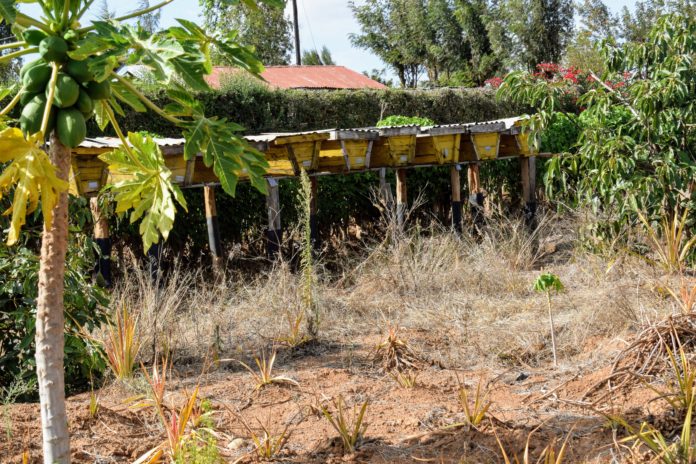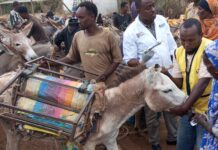By Rahab Gakuru
Laikipia County, Kenya: Located in a little-known Sipili village in Laikipia West, The Dimcom Eden Villa Estate is the first of its kind in Africa, a perfect ecosystem of farming & environment. The farm has complete essentials to ensure great picnic sites, beautiful crafted wooden chairs, and traditional canopy huts for green tourism as a learning institution for aspiring farmers.
The farm has a lane around 7.5 hectares of land, dedicated to jogging, walking, and bike riding. But the most unique element in the farm, which has over 30 varieties of fruits, is at the center of the farm is forbidden fruit. The only fruit Mr. Muriithi prohibits his family and visitors from eating.
“We felt that having missed a chance to live in Eden due to sin committed by Adam & Eve, we thought we could establish our own,” says Mr. Charles Muriithi, a Kiswahili and Christian Religious Education (C.R.E) high school teacher at Lariak Day secondary school.
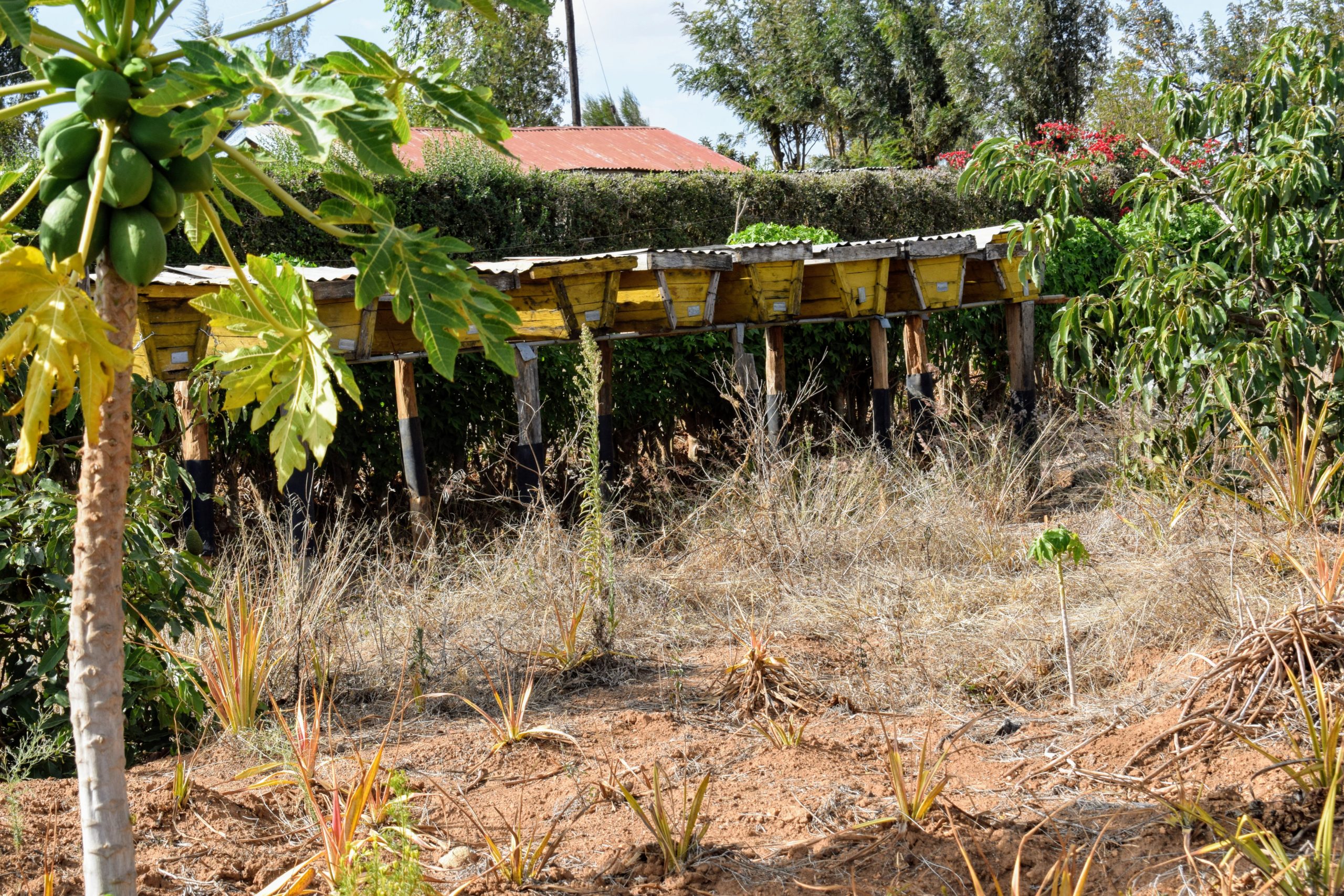
Mr. Muriithi told us the hilarious story behind the Eden Villa farm. “I started this project when I found my children eating pineapple peels. I felt so challenged. So, I took one hectare and planted all types of fruits for domestic use, but later that year I made a good profit from selling the fruits and I knew this is the way to go. And in 2008, the whole farm was a fruit zone. Before then, the land would carry maize or wheat.’’
The farm carries oranges, loquats, cherimoya, avocadoes, pawpaw, figs, lemons, tree tomatoes, passion fruits, guavas, white sapotes, macadamias, apples, sugarcane, bananas, mal berries, yams, cassavas, sweet potatoes, mangoes, and tree tomatoes.
The Dimcom Eden Villa Estate also practices beekeeping, livestock, and Kienyeji chickens (Kienyeji chickens are traditional chickens found in the villages). To fulfill domestic demand for fruits, trees, and flowers, Mr. Muriithi started a nursery. “I use manure from the livestock and chicken for my plants. I also have a kitchen garden where I grow vegetables like spinach, kales, cowpeas leaves(kunde), pigweed(terere), for home consumption.” He says.
His passion and good work moved the Japan International Cooperation Agency (JICA) to step in and sponsor a 45 days training for him to study Agribusiness course in Japan. The main focus for the training was the Implementation and promotion of Agribusiness in African countries.
“While in Japan I learned that farming can be a business just like any other business. Farming has a greater profit margin than most businesses. But then I also discovered green tourism. When I got back from Japan I started a similar concept, which was launched in 2013 by JICA.” He says.
In his visitor’s book, Mr. Muriithi has recorded over 1,000 people who have visited the farm since it was officially opened on 24th August 2015.” We would charge a gate fee of Ksh 1,000 for tourists. For the Kshs 1,000, you get to pick fresh fruits to eat or make juice on the farm, as you enjoy bird watching and fresh air. However, all the fruits must be eaten within the farm. For any carry-on fruits, an extra fee has to be paid.
The farm also has traditional huts for tourists to sleep in which will cost an extra Ksh 2,000 per night. I have hosted guests from Japan, Switzerland, the United Kingdom, the United States of America, France, Australia, India, and South Africa.
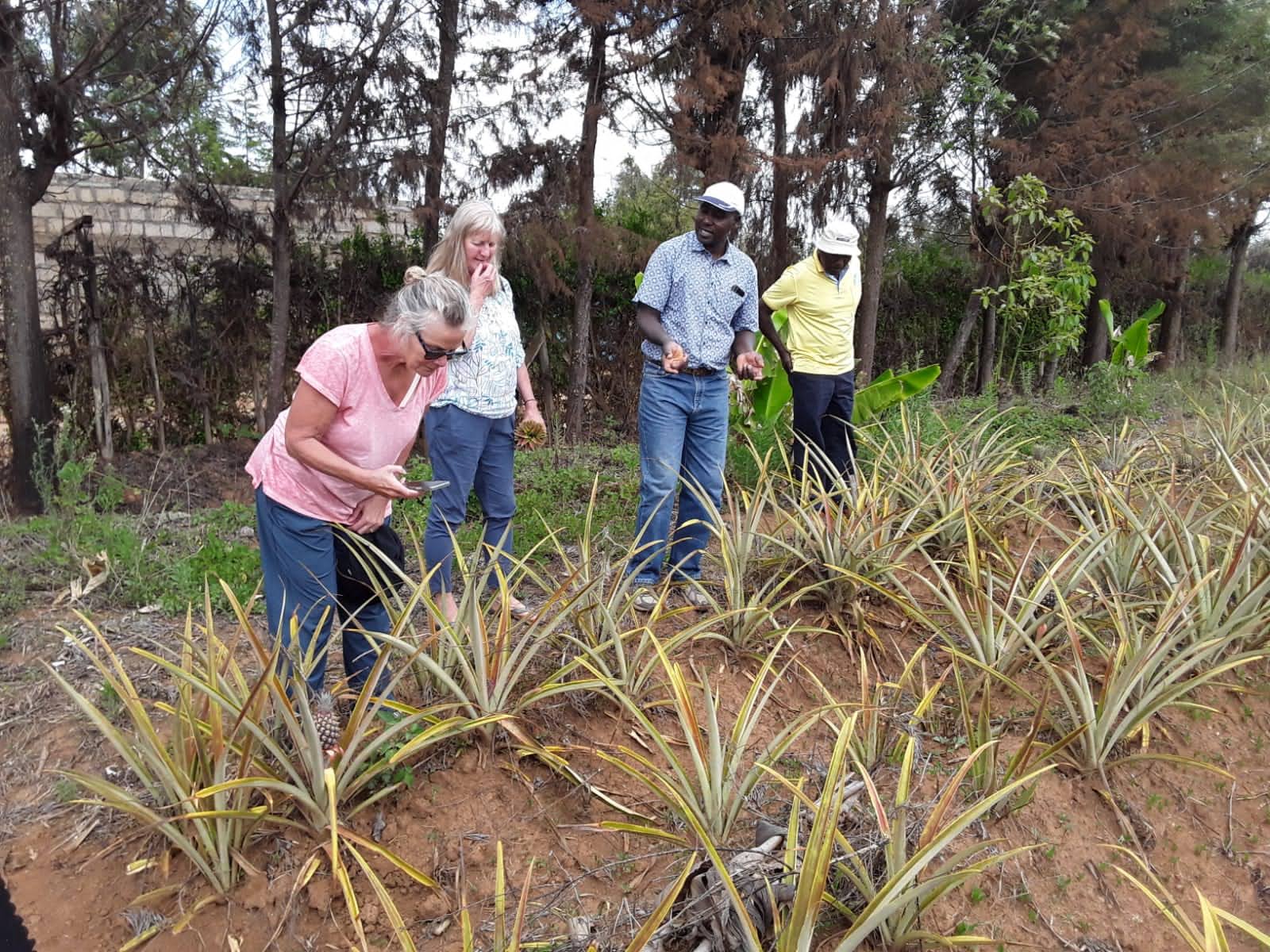
In a month the farm would receive about 30 guests. But like the tourism sector in Kenya, Mr. Muriithi’s green tourism concept has not been spared by the effects of the coronavirus pandemic. They have not been able to hold any large training groups or host tourists.
He, however, hopes things will go back to normal once everything is open in the country.
The Dimcom Eden Villa Estate holds group training for farmers at Ksh 200 per adult and Ksh 100 per high school student and Ksh 50 per primary student. Training them on dairy, farming, beekeeping, drought-resistant foods, and fruits farming. His objective is to change the perspective of farming held by young people.
“The best change can come from me and not from others. That is why I want young people to appreciate farming. I want them to know that you don’t have to move to town to earn a living. I want them to see how cool farming can be,’’ says Mr. Muriithi.
According to Mr. Muriithi, lack of space and finance is their greatest challenge to fully implement his vision for the land. “I have been training people, but very few farmers are willing to change their farming methods. We are also not very well known, so it’s hard getting people to visit and experience the beauty of Eden Villa Estate. Being in an interior rural area we also lack key amenities like electricity.”
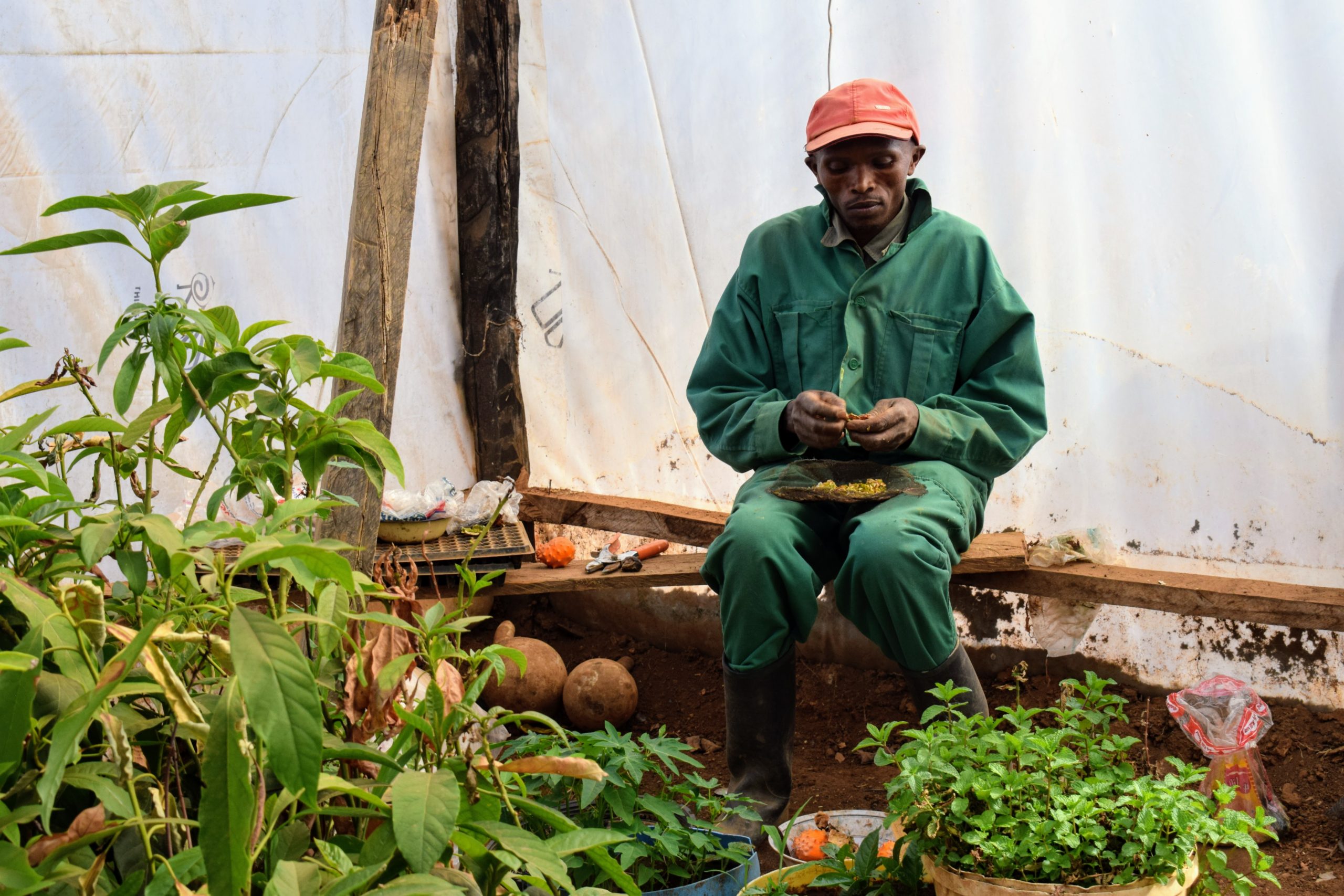
The agriculture sector is the main economic activity in Kenya’s rural area. According to the Food and Agriculture Organization of The United Nations (FAO), the sector employs more than 40 percent of the total population and more than 70 percent of Kenya’s rural people.
As the country’s population continues to increase significantly from 11 million in 1970 to 53 million in 2020, the land parcels in the areas of high agricultural potential are decreasing in size, affecting food production. FAO’s vision for Kenya is to ensure agriculture helps to improve the living standards of all, especially the poorest, in an economically, socially, and environmentally sustainable manner freeing the population from hunger and malnutrition.
Mr. Muriithi believes in harvesting water from roofs & surface run-off for his home use and farming. Also, with most of his plants being permanent, tractors are forbidden on his farm; this means a lot of manual work, which he offers as casual work to the community. His wife works as the farm manager.
The farm also houses the Nelson Mandela Park measuring 20m by 20m, four traditional circular huts, a nyama choma zone “Nyama choma is a swahili word meaning roasted meat.”, and a bird feeding station where wild birds are fed and watered.
With over ten species of indigenous trees to keep the park cool, Mr. Muriithi has drilled a borehole to aid in a new horticulture project he is embarking on. “Currently, we are installing tanks to hold water from the borehole. I will also build a swimming pool to actualize the park. Nelson Mandela was a man I admired and so the park takes his name.” He adds.
In 2016, at a National Farmers Award Scheme, Mr. Muriithi was the 2nd best farmer in Kenya in the category of small-scale farm geared towards full commercialization. “In February 2021, we were awarded by the Cabinet Secretary for the Ministry of Environment and Forestry, Keriako Tobiko as the best farm in Kenya practicing Climate Smart Agriculture. It was a competition called Green Innovations Award IV. My thematic area was climate resilience.” 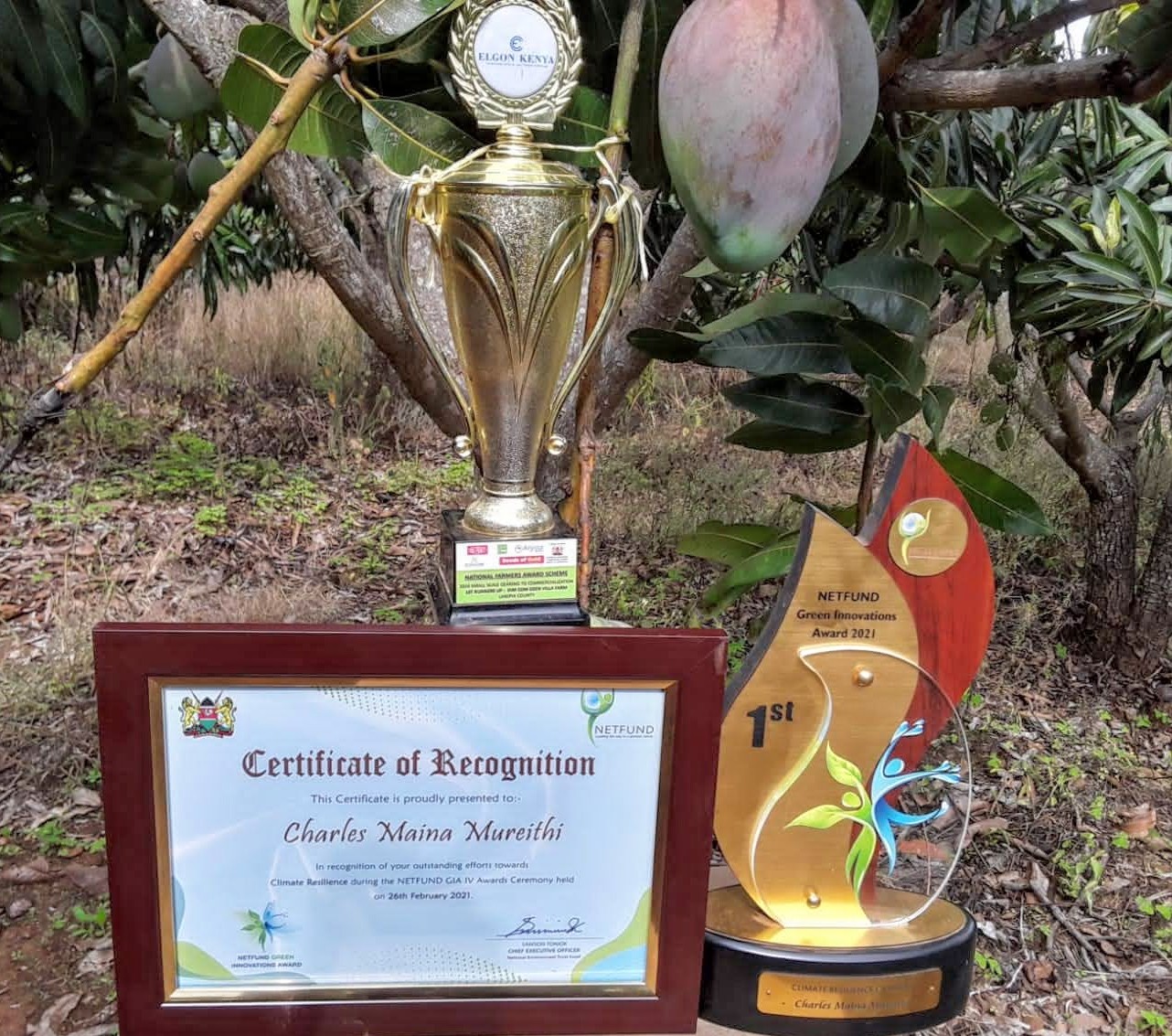
In the future, Mr. Muriithi hopes Dimcom Eden Villa Estate will grow to become a research center for efficient agricultural & environmental practices. “We hope to build a holistic farming estate where students, farmers, and environmentalists can learn skills, tourists can relax, a haven for people to reflect and heal, as well build a sustainable business.

